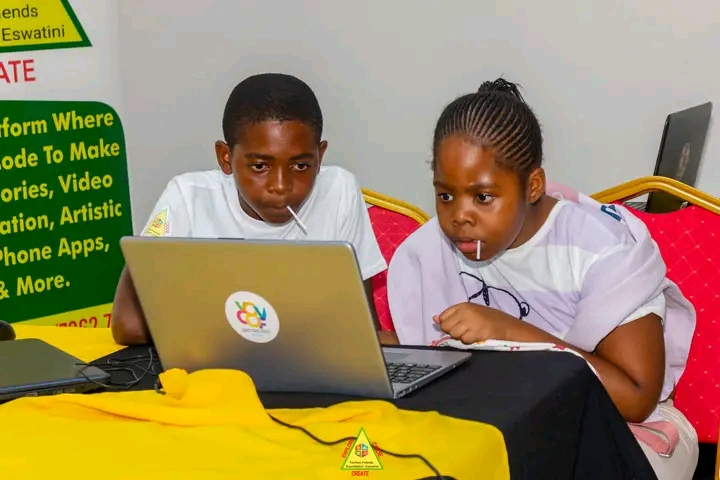
By Nokukhanya Musi – Aimienoho
Siwakhile Mthetwa (12 years) is among 35 girls ranging from 6 – 14 years taking a course in Artificial Intelligence (AI) at a periodic workshop conducted by Bongekile Shiba who runs Techno Friends Eswatini that teaches young girls how to create e-books using AI, coding, programming and other digital tools.
Techno Friends Eswatini won third place in the ESCCOM Innovation Challenge. These books tell stories of rural life in Eswatini and how their everyday challenges can be solved. Siwakhile authored a book using AI technology urging government authorities to transition from the use of coal to cleaner energies such as solar to reduce the prevalence of lung infections such as tuberculosis (TB) in her community. This story looks at how AI can transform the lives of village girls by helping them add their voices to influence change on pressing societal issues that affect them. It will also tell an inspirational story of how young children can become authors at such a young age.
Techno Friends Eswatini is making strides towards changing this bleak and hopeless narrative for young girls by opening a world of opportunities and bringing hope to young girls. With little confidence in the education system and its inability to prepare young girls for the future as well as a realization that children in Eswatini had little or no clue of what was going on in the world in terms of technology, Shiba dedicated her life towards teaching young people computer science. Techno Friends Eswatini is an initiative aimed at helping children acquire digital skills by introducing and guiding them in platforms where they use computer programming skills to create interactive stories, video games, animation, art and more in Scratch under her guidance online over Zoom App, is a beacon of light.
Founded and directed by Shiba who holds a BA in Humanities from the University of Eswatini and a Post Graduate Certificate in Education (PGCE) from Rhodes University, the programme helps children think critically, creatively, solve problems, exercise logic and work collaboratively with others. The qualified teacher with 13 years of teaching experience for both Primary and high school levels who is also a Career Guidance Counsellor learnt coding from online coding platforms such as Code.org, the Code Academy, Code Monkey, Scratch and YouTube tutorials. The qualified teacher, Career Guidance Counsellor, and Robotics and Computer Coding Facilitator encourages and empowers girls and boys with information, communication and technology skills to create computer science projects that can solve a problem in their environment.
TECHNO FRIENDS’ CHILDREN ARE AGED BETWEEN 6-18 YEARS
Shiba strongly believes the earlier the better. “Often, we have been told that, if you want to get good at something, you have to start early in life. Many successful swimmers, athletes, soccer stars and programmers started working on their crafts at a very tender age. Children grow and develop rapidly in the first 5 years of life, their physical bodies, language and communication skills as well as cognitive and social growth are at their peak. It is during these years that they learn to think, communicate, explore and figure out the world around them,” she states. According to Shiba, parents need to foster their child’s cognitive development as soon as he or she is born because that lays the foundation for his or her success in school and life. “Many of our children born during the fourth industrial revolution are very much familiar with smartphones and prefer them over their toys. It is therefore the responsibility of every parent to take it upon themselves to ensure that the future of our children is secure for the benefit of Africa as a whole,” she adds. She guides her students on ‘technopreneurship’ opportunities and other digital careers.
ALSO READ: Artists must have side hustles to keep brands alive – Percy P

Grade Three pupil Aviwe Shabalala whose favourite subjects are ICT, Maths and English aspires to become a Software Engineer because as she put it, “so I can help people get rid of bugs in their apps.” Shabalala joined Techno Friends last December and says she has had an enjoyable experience with the group and learnt how to create Apps and upload characters. Tiyandza (11-years-old) Msibi’s father Gcinumuzi is amazed at how his daughter has grasped the basics of programming. Msibi Junior who loves Maths and ICT finds her experience at Techno Friends fun and interesting. “I have learnt how to use loops, functions and soon, I will be creating a phone app. I’ve managed to make educational projects teaching other children about the world. I have also learnt a lot too through research,” she states. She sees herself becoming an entrepreneur and therapist when she grows up.
SHIBA IMPRESSED WITH PROGRESS
She says that the young programmers in her care enjoy conversations about other planets and galaxies beyond our line of sight. They talk about the possibilities of other worlds like Earth in other galaxies and imagine what life is like in them. “They desire to venture into the unknown and establish their presence. They are excited by NASA’s discoveries of new planets and want to explore them. They are a blessed generation in a golden age of “free” information,” she says. She, however, believes it’s the education system that then programs children to abandon their imagination. At Techno Friends, the children are taught how to build prototype machines and write the code for them to follow instructions. Techno Friends eSwatini is mostly self-funded and the students pay a small fee to assist with the running costs at the centre. Through the assistance of the Forum for African Women Educationalists Eswatini (FAWEESWA), Techno Friends intends to arrange for job shadowing, internship and employment with local companies for their students in the long term.





